It all started with an odd pile of shells: a pile that, upon closer inspection, fell apart like a flower losing its petals, introducing a burned-out nature documentarian named Craig Foster—and, in time, the world—to the octopus hiding cleverly inside.
Known simply as “her,” she would become the star of My Octopus Teacher, the Oscar-nominated Netflix documentary and surprise pandemic hit that told the story of Foster’s unlikely relationship with that eight-armed mollusk.
Released in September 2020, it arrived at the perfect moment. Audiences exhausted by lockdowns and unrelenting 2020-ness were primed for escape into the undersea fantasia of South Africa’s kelp forests, where Foster met her. Best-selling books like The Soul of an Octopus and Other Minds: The Octopus, the Sea, and the Deep Origins of Consciousness had whetted public curiosity about these uncannily intelligent creatures with whom humans last shared a common ancestor 600 million years ago.
Yet while most writing about octopuses emphasizes their ostensibly alien, unknowable nature,1 and serious, science-minded nature documentaries elevate concern about biodiversity over sentiment for a single animal, My Octopus Teacher defied convention. It embraced Foster’s feelings for the octopus, which over the course of a year evolved from curiosity to care—even to love. And though her own feelings were left for viewers to interpret, the film’s indelible impression was of nature populated by species who are not only beautiful and exquisitely evolved and ecologically important, but highly sentient, too.
Nautilus talked to Foster about his octopus teacher and how getting to know her changed the way he thinks about nature.
I write a lot about nature and biology and ecology, but in the last few years I’ve focused on the minds of animals and how we think about them. Part of what sent me on that path was an article I wrote a decade ago2 about researchers trying to understand how octopuses control all eight of their legs simultaneously.
They would put electrodes into an octopus’s brain, run an electric current, and see how they moved. Eventually they could reverse-engineer a map that correlated brain activity and arm coordination. The researcher was a nice, thoughtful person, but there really seemed to be a lack of empathy toward the octopuses themselves.
It was an example of what I think is a widespread habit in how we look at wild animals: almost in terms of tech specs, looking at the surface and not thinking about the minds and inner lives and relationships that other nonhumans have. And so for me—and a great many people—that’s what was so wonderful about My Octopus Teacher. It was about the relationship as well as the natural history.
My first sense from this story is of disconnection from the personal lives of wild animals. It’s what I call a cooling of the heart toward wild nature. The scientist you interacted with was probably a very nice person—but just didn’t seem to think that the animals they experimented on were very sentient and probably in enormous distress. That cooling of the heart, that disconnection from the wild, I think is in some ways the most dangerous thing on the planet at the moment. If you have that feeling and that disconnection, you can do anything and feel okay. And I think that’s why we’re in a very precarious position as a species.
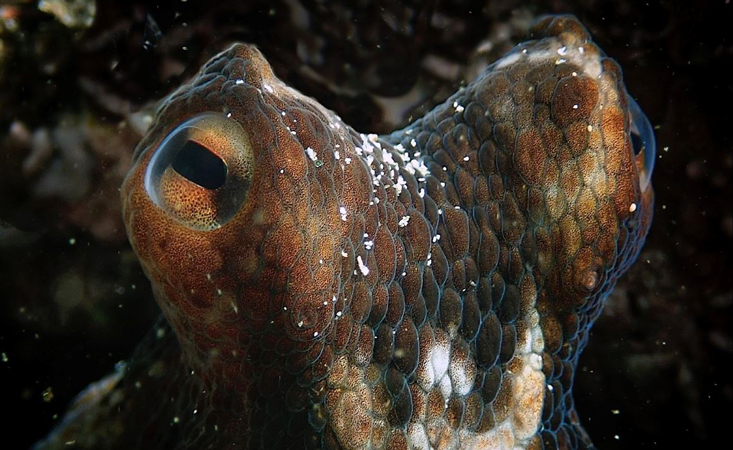
What did her tentacles feel like on your skin?
Octopuses don’t have tentacles as such.3 Only squid and cuttlefish have tentacles, and those are the two attack tentacles. Octopuses only have arms.
There’s a sort of a slime that’s on the arms, but they clean their suckers meticulously so that they can have powerful suctions. It feels like little suction cups sucking onto your skin and it can be very, very, strong—but if an animal is just curious and knows one, then they’re obviously not applying full force. It’s more of a touch. It’s hard to explain exactly what it feels like. I guess it’s like many little suction cups pulling your skin up at the same time. And of course they can also taste with their suckers, so they’re both feeling you and tasting you and smelling you.
That’s delightful, and thank you for correcting me about the tentacles. I’m sorry to make that mistake. I don’t like to talk about somebody’s friend like that.
You don’t have to worry. People like David Attenborough have made that mistake. Many people make that mistake. It’s a pity because it’s such a lovely word, tentacles. It’s a much nicer word than arm.
In the film your friend became her and had the pronoun that identified her as an individual—but the shark who ultimately bit off one of her arms remained an it. Why was that?
Mostly because I didn’t know that particular shark intimately. So in that very dramatic moment I wasn’t thinking to look underneath and see if it had claspers, to see if it’s male or not.4 That it was not a conscious thing as such. You’re probably right, though, it should have been the same.
Those sharks are very dear to me. I’m very close with them as a species; I’ve watched them very closely for a long time. I know one or two intimately. They’re a vital component of the whole ecosystem, and they’re a vital component for the health of octopus. Especially now because many of the big reef fish have been decimated and those fish would be important predators of octopus. Now those pyjama sharks have taken their place to a certain degree and help with keeping that balance.
There was never any intention to diminish them. They’re certainly not the bad guys or anything like that. Their lives are very fragile—quite a lot more fragile than the octopus, actually, because they mature very late and only lay two eggs.
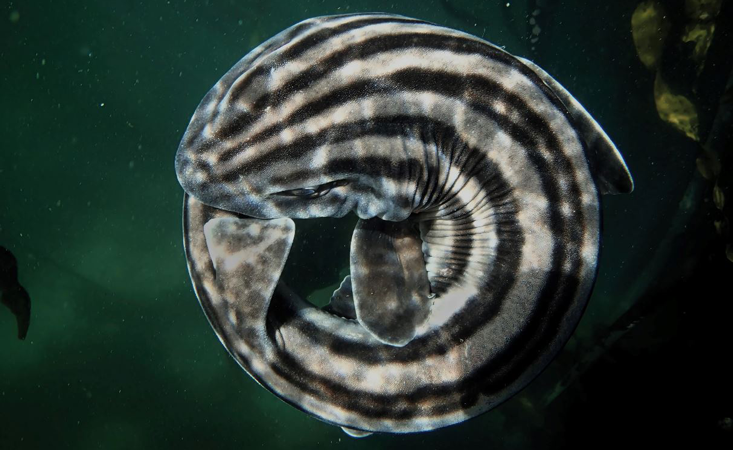
How do you make peace between caring so much for one animal and also caring about the creatures who are trying to eat her? This is a tension I wrestle with myself, and I think many people do who really care for the wild animals around them. I have groundhogs who live under my deck, and I love those groundhogs—but I also love the foxes who want to catch them. I kind of feel torn between that sometimes.
The frustrating thing about a film is that you’ve only got 85 minutes. What you don’t see is that I have watched those pyjama sharks for years. I’ve watched them lay eggs in the kelp forest, I’ve watched the eggs slowly mature and those tiny little sharks maturing inside. I’ve watched them, a few of them, actually hatching out of the egg. I’ve watched most of them being predated and killed by whelks and by sea stars, and I see how incredibly fragile they are. I see them sleeping in their caves. I’m incredibly close to that species of shark.
We cause immense suffering for ourselves by disconnecting from the wild.
I know all their little intricacies. There’s no time, unfortunately, to show all that. I’m close to many, many different species. What you see in the film is how I’ve been very close to the octopus, my teacher, and she was so special—but what you don’t see is that I’m close to many different animals. All the different types of fish I got to know extremely well, otters, even some of the mollusks. Whales. There’re so many different animals. There’s no time to show all of that.
So it’s very easy to not have favorites because I know how incredibly hard the life of a pyjama shark is and how incredibly difficult it is to get to adulthood. And it’s sometimes horrific to see fishermen catching these animals and just throwing them on shore and letting them die because they don’t want to take a break. There’s no way I can have favorites while being close to all these animals and knowing all their lives. And who am I as a human with my limited understanding to interfere in a system that has, in a way, been built by this giant biological intelligence over millennia.
You might actually have just answered another question of mine. In the film, when you describe your choice not to intervene in the pyjama sharks’ pursuit of your octopus teacher, you say there’s a line that can’t be crossed. Where is that line between helping and not helping? Why should one not cross it?
I guess the simple answer is that if you’re going to intervene between predator and prey, like your groundhogs and foxes, you’re asking for trouble. But if it’s a single animal that’s in great distress, and you can do something just to help that animal a little bit—they have lives that are so tough anyway, and we’ve made their lives so tough. So if one of your foxes had a damaged leg or was really struggling you could just help that animal a little bit to get past that. If it didn’t interfere with the rest of the group or with other animals, that might be viable. That, for me, is the line.
We desperately need nature to regenerate itself. We need to leave big parts of the wild alone and let them regenerate. It’s actually critical. And if there are individual animals that we can help—we have created a world that is very difficult for them to operate in, but if we actually intervene in the natural process of survival between species, that doesn’t help the natural system.
I like the way you phrased that. It’s kind of how I think of it myself. Over the years I have actually treated those foxes a couple times for mange, and I do appreciate that perhaps in some way I’m interfering with the natural process of disease and their population density on the landscape. On the other hand, mange is just such a terrible way to die. I can’t just stand by when I could do something.
I totally agree. The only thing to add to that, where you have to be slightly careful, is if an animal hasn’t got strong genes. And then you interfere and you allow that animal to procreate. You could potentially be making the gene pool weaker and more susceptible to mange. That’s where you have to be a bit careful.
Absolutely, and it’s the kind of thing we take responsibility for when we intrude like that. I think it really makes it incumbent on us to act as knowledgeably as we can.
Exactly. Very carefully, with a deep biological understanding.
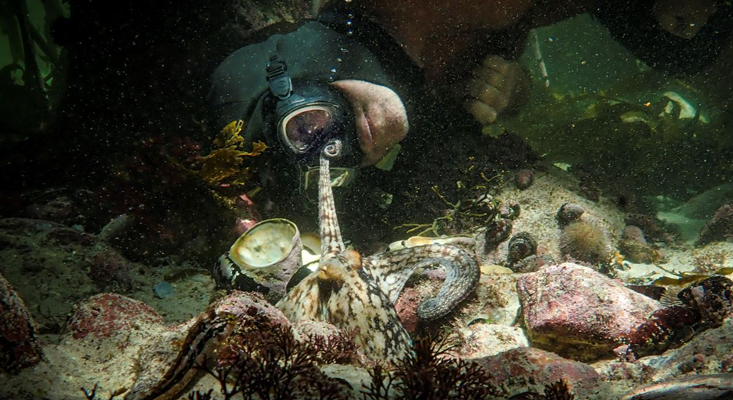
You mentioned how awful it is to see pyjama sharks caught and thrown onto shore. I could hear the pain in your voice as you said that.
Many of the people I know in the animal advocacy world struggle with how to process all the pain that they’re aware of. In some ways, not really thinking about the personal lives of animals buffers us from that. It protects one from the psychic difficulty of seeing the suffering of other animals. How do you cope? How do you make peace with that suffering—the suffering that we cause, and also the suffering that is going to exist independently of us?
That’s a really difficult question. It sometimes is very overwhelming.
I work with a lot of young people who are very dedicated to conservation and to nature, and see how it difficult it is for them to deal with climate change and the environmental crisis that is unfolding. The more you know, the more painful and scary it becomes.
I would rather be studying a tiny bird every day than going on an enormous wildlife adventure every few months.
What does help me in a way is that one of my big interests is human origins. I’m interested in Middle Stone Age life—100,000 years ago, 50,000 years ago. One can see these enormous changes over time. Even in my lifetime, I’ve seen many species fluctuating radically in their numbers. It does give me hope that the wild system has immense capacity to recover. It gives me hope that if we can wake up from this sleep, this disconnection from wildlife, then they can recover.
The personal suffering that one becomes aware of is difficult to deal with because, I think, these animals are way more sentient and feel way more emotion than we ever imagined, so it’s not easy to deal with that. I don’t have an easy answer. Do you have an answer for that?
I certainly don’t have a simple answer, or even a complete answer, and maybe this is a bit of a cop-out—but the way I think about it is that human life has a great deal of suffering, too. There’s no way around it. But that doesn’t make our own lives any less special. That doesn’t take away from all of the good.
With the lives of animals, I think sometimes we have a tendency to emphasize one or the other. We want to see all the good parts and act like the bad isn’t there—or we see only the bad stuff, and don’t think about the good. And I think that comes from a well-intentioned place, a place of compassion. In the end I think the good outweighs the bad. Or at least the opportunity for good outweighs the bad.
In spring I like to watch herring as they return from the ocean. And then, a few months later, I’ll go swimming and these vast schools of fish who hatched from their eggs will pass by. It’s such a glorious thing. But of course 99 in 100 of them will be eaten soon, or die from disease, or not get enough to eat. I once asked someone—I think it was the philosopher Sue Ruddick—how to make peace with that and she said not to focus on the fact that they’ll die, but on how they have a chance to thrive.
Maybe that’s just a way of trying to make myself feel better, but I think there’s something to it.
It’s a good way of looking at life. I think that one of the real sufferings we have as a species is that we have in many ways severed the thread to the wild. The thread that’s been with us for 6,000 generations. And that is, consciously or unconsciously, extremely traumatic and difficult for us as a species. We cause immense suffering for ourselves by disconnecting from the wild.
I’ve been very close to the octopus, my teacher—but what you don’t see is that I’m close to many different animals.
This morning I was out as usual and there was just an incredible sight in the very shallow water. This beautiful, fully wild octopus was moving around, hunting in the shallows. And it was just absolutely wild, absolutely free. They only live for a year, a year and a half—so that animal hasn’t got many existential problems. It is just thriving in its wildness.
In that space it’s extremely present. So for some animals it is good—but for many, unfortunately, like the African penguins here, the problem is the food source. We are diminishing their food source. For many of them it’s a slow starvation, which is really tough to deal with.
So as one comes to think of oneself as being surrounded by sentience, how does that change one’s relations to the wild world? What comes out of that—for yourself, and for us?
I think that it’s many things. You realize this tremendous intelligence and the sophistication of these animals’ lives. The things they do to survive and procreate are so fantastical and magnificent that it develops a sense of awe that you’re surrounded by these real stories of wild animals that are far more radical than our wildest science fiction. That gives one a sense of absolute awe for the nature. It certainly makes me want to know more and be more curious and step deeper into their secret lives.
It fills one with such a joy to see this sentience unfolding. Especially if one has had the privilege of being able to immerse and it’s been revealed in a profound way. And then the next thing that happens is you realize that their lives and our lives are not separate. They are completely interlinked. The health of their lives and the health of biodiversity directly affects our health and our wellbeing. Even for people who don’t have any contact with them, or any sense that they exist.
This is a simple example that I’m sure you know: The ocean produces at least half of the oxygen we breathe. But everything we take in, everything we drink, everything we breathe, everything we eat, is completely reliant on biodiversity being in place in wild ecosystems. And that’s what we seem to have forgotten: that the great Mother Nature is literally keeping us alive from second to second.
You realize that we are totally interwoven with this giant biological intelligence. If we wish to continue living and if we wish to continue living healthily, we should be doing everything in our power to sustain and regenerate that biodiversity.
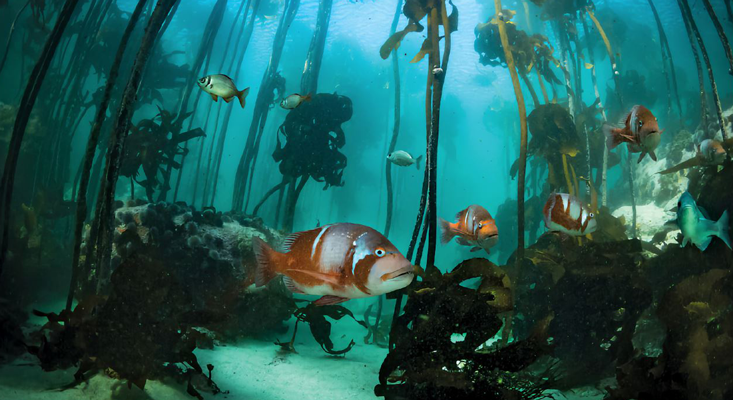
At the end of My Octopus Teacher, when you describe how the relationship changed your thinking, you said, “What she taught me was to feel that you’re part of this place, not a visitor, and that’s a huge difference.” Why didn’t you feel that way before? As someone who makes nature documentaries you have certainly been immersed in the wild world all your life.
For me that sense of not feeling like a visitor only came when I could understand the wild language properly. That comes from the tracking and that comes from years of going in every day, sometimes twice a day. That’s what I’m doing now. There’s a big shift that happened with me. Suddenly I could speak the wild language, I could see the motivations, I could see into the secret lives of these animals. Suddenly I felt I could speak the same language, albeit not very fluently. That made a massive difference.
Before, I had spent a lot of time in nature, a lot of time filming, a lot of time knowing the animals—but more on a surface level, not actually being able to track them very well, or understand this wild language I’m talking about. I was never much good at it. I could film animals very well, but it’s a very different thing to immerse yourself in the wild, spending every day dedicated for months and years.
I needed to break through that surface layer and really sense what these animals were about. And I could predict what they would do, I could see the tracks and know what they did in the night. I could see trends of population explosions and animal populations diminishing. I really felt part of the system and I felt I understood the system to some degree. Do you understand what I’m saying?
Very much so.
It sounds like you’ve had a similar experience.
I would say so. Not quite as immersive as what you had, but it made a great difference to me. A few years ago I lived in a suburb of Washington D.C. It was kind of a transition zone between city and country, and there was much more wild life than I had expected. Down the street from me was a stormwater retention pond and there was a little pocket forest beside it. For the two years that I lived there I would just go there every day, often twice a day, and just sit.
As I got to know those animals—not always as individuals, but at least as very distinct communities, and sometimes as individuals—it opened up such a different window onto their world. Before that I certainly appreciated them, and I would be happy to see a mockingbird or a sparrow, but I didn’t fully appreciate that it was a very particular sparrow with social relations and for whom this stormwater pond was part of their neighborhood just as it was for me. And I could see the relations playing out around me; I knew their morning rituals, where they would go for food, how they interacted and responded.
Exactly.
So that type of awareness that you’re describing—is that something that people can get if they just live in a city or in the suburbs, if the animals they have are squirrels and sparrows and common creatures?
Absolutely. It’s easier, in a way, to do that. The trick is having regular, daily access to the animals’ lives. So birds are perfect to work with. Insects are perfect to work with. In fact a friend of mine, Jon Young, put out a wonderful book called What the Robin Knows, about understanding how bird language works. I would rather be studying a tiny bird every day than going on an enormous wildlife adventure to deepest Africa every few months. You’ll get more out of that daily interaction with the bird or insect in your backyard than the sporadic, very dramatic adventures.
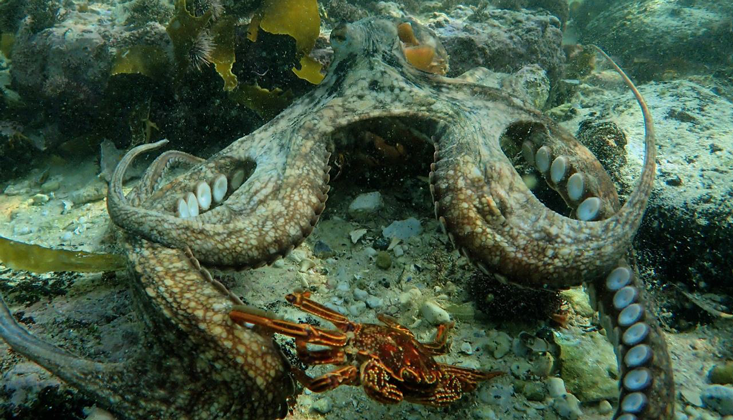
There was an online conversation sparked by the feminist scholar Sophie Lewis, who critiqued My Octopus Teacher through a lens of queer theory. I found the critique to be really problematic on several levels, including how she spoke so glibly about a relationship that mattered so much to you. We would not treat someone’s relationship with a fellow human like that.
So that bothered me, but she did ask an interesting question: many times you and your octopus teacher touched one another, but as she was dying, you did not try to hold her. Why was that?
I’m never the one initiating the contact. It might seem so if you’re not watching carefully, but I generally never initiated contact. That’s the sort of rule I have and more strictly so now. I even try to minimize contact with wild animals just in case I remove their fear of humans and then they come across a human who wants to hunt them or eat them or whatever.
So I’m not initiating contact. That’s the first thing. And then, when she goes into that cycle of egg-laying and reproduction, she cut off contact. She didn’t want contact anymore. And I felt the dying was part of that process.
There’s a place in the film where I say, “And this is the last contact.” It was allowing her to make that decision. I never want to impose my desire to make physical contact on an animal. I don’t think that’s fair.
Last question: At one point in the movie you wonder, “If she dreams, what does she dream about?” What do you think an octopus dreams about?
As you may know, there is research suggesting that octopuses do dream.5 I think she dreams about hunting, and perhaps about eating. Perhaps her predators come into those dreams as well. That’s my sense. She stays in her den for most of the time, and then she goes out on these incredible wild adventures to hunt. And each one is quite an extreme experience in many ways, especially if you add predators into that. So I think she probably dreams about these forays out into that world where she needs to go. And this tremendous balance that all octopuses have, this balance between fear and curiosity.
That would be my sense. But I’d hate for you to say, “Craig thinks that this is what octopuses dream about.” I don’t know—but that would be my guess.
Brandon Keim (Twitter / Instagram) is a science and nature journalist. He is presently working on Meet the Neighbors, a book about what understanding animals as fellow persons means for human relations to wild animals and to nature.
References
1. Marino, L. Can we stop “alienating” octopuses? SentientMedia.org (2020).
2. Keim, B. Acrobatic octopus arm could be model for flexible robots. Wired (2009).
3. Kassel, M. Octopuses don’t have tentacles! Discovery (2019).
4. Cooney, P. Why do sharks have two penises? TheFisheriesBlog.com (2014).
5. Imbler, S. See an octopus change color as it sleeps, perchance dreams. Atlas Obscura (2019).
This article was originally published on our Oceans Channel in April 2021.






























